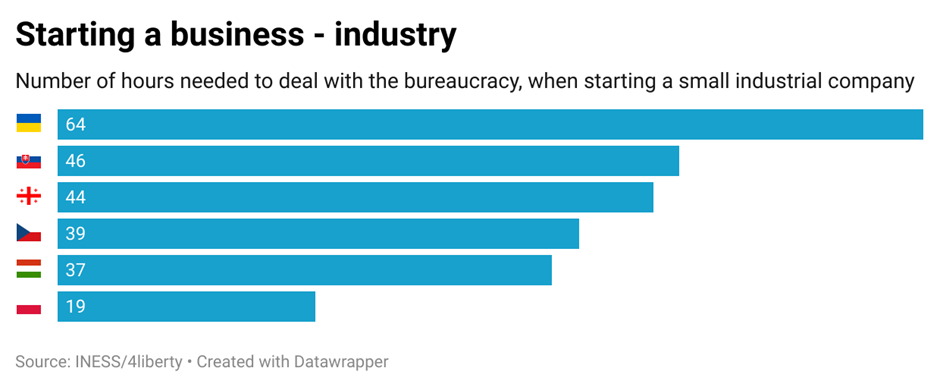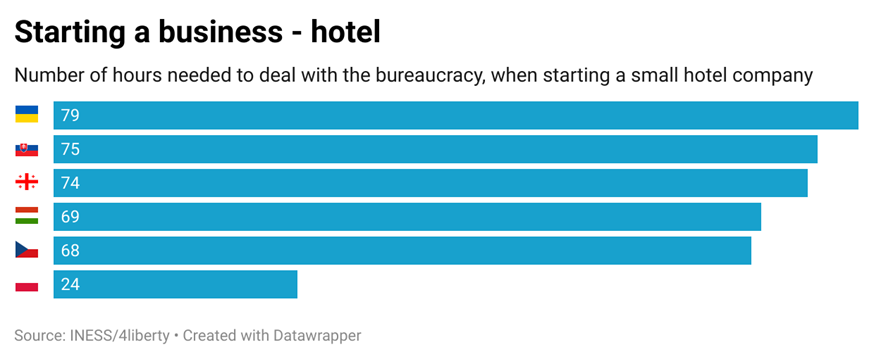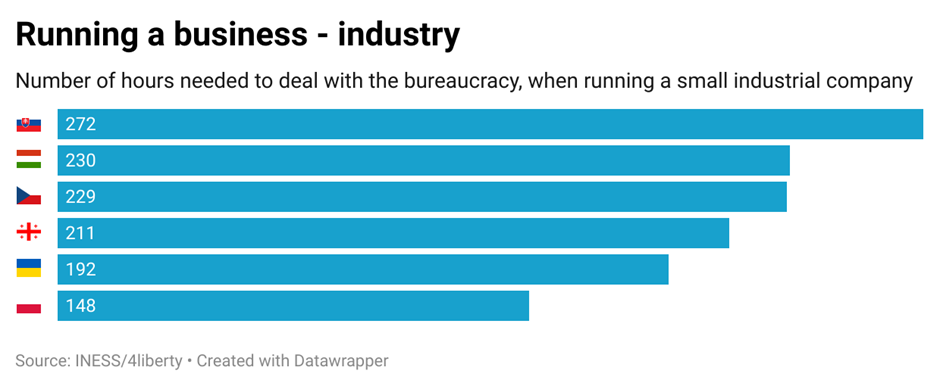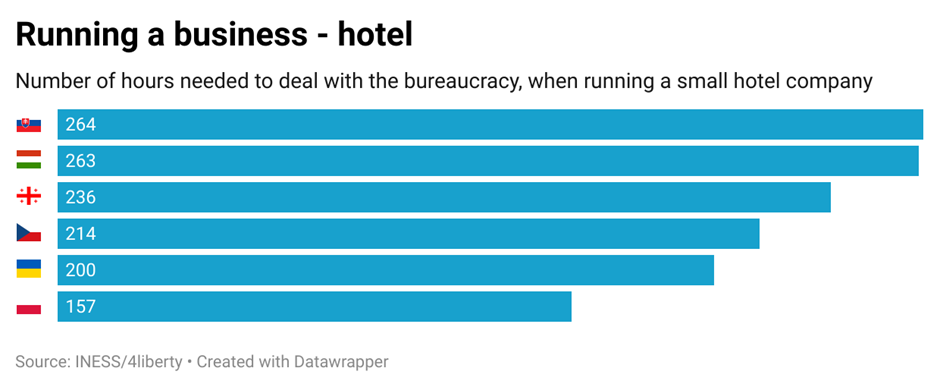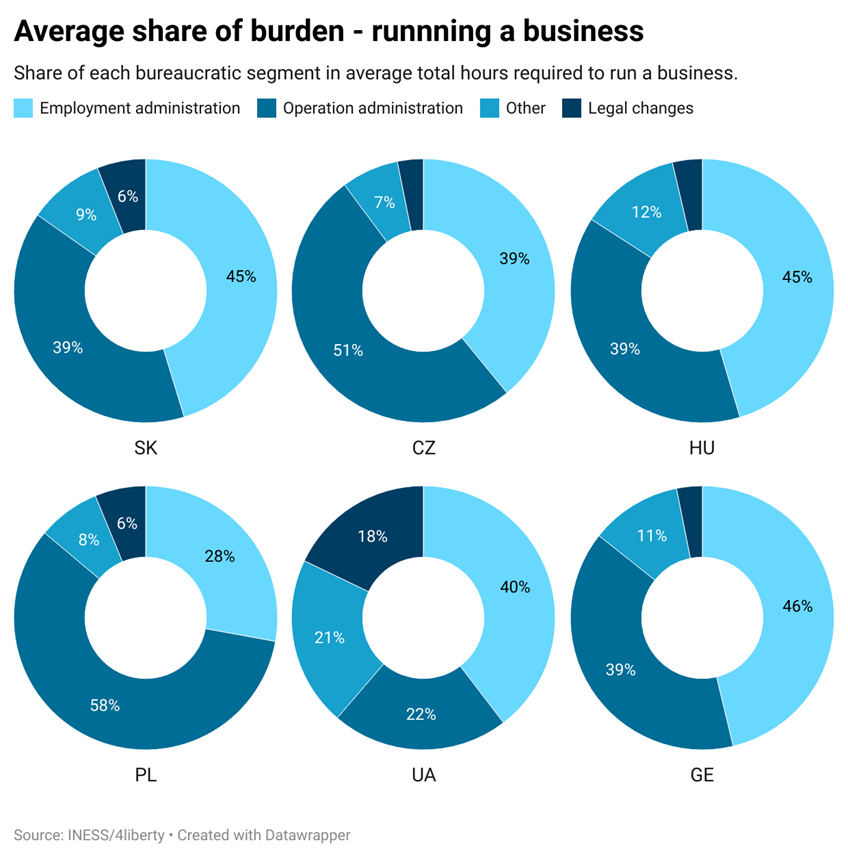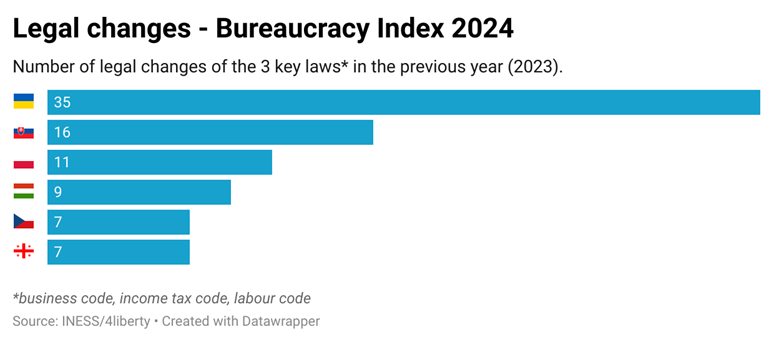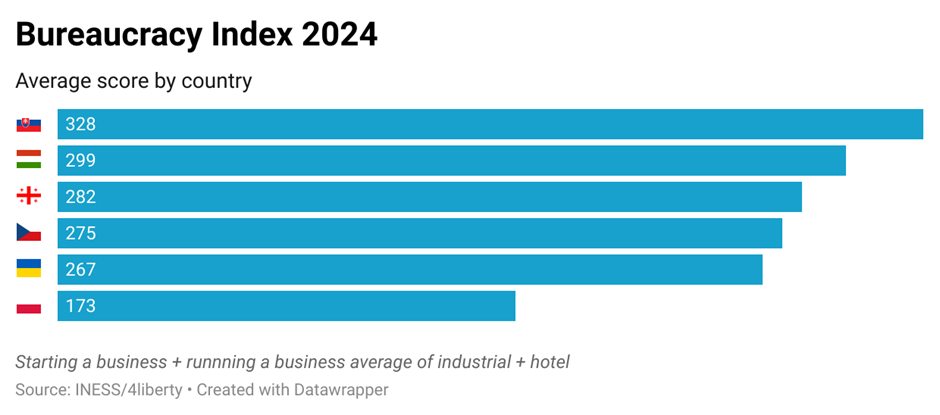How bureaucracy hinders business in Ukraine: survey results
Among the six European countries surveyed, Ukraine's bureaucracy is the most business-friendly after Poland, while Slovakia has the highest bureaucratic burden.
The BureaucracyIndex has been calculated since 2016 by the Slovak Institute of Economic and Social Studies (INESS) to assess the regulatory compliance faced by small and medium-sized enterprises (SMEs) when starting a business and its daily operations.
TheBureaucracy Index assesses the length of time it takes to complete tasks and the problems encountered in complying with regulatory requirements. The index is calculated for two simulated businesses - a small industrial company and a small hotel. The tasks and problems are grouped into the categories of "starting a business" and "doing business" and are measured in hours of administrative work by the company's employees.
In 2024, six organizations* that are members of the European network of liberal think tanks 4Liberty from six countries - Slovakia, Hungary, Poland, the Czech Republic, Georgia, and Ukraine - took part in the calculation of the Index. Our country was represented in the study by the Institute for Economic Research and Policy Consulting. The study was supported by the Friedrich Naumann Foundation for Freedom.
Starting a business
Among the countries surveyed in 2024, Ukraine had the highest regulatory burden for starting an industrial SME - 64 hours. In Poland, the figure was the lowest - only 19 hours. Other countries required significantly less time to start a business than Ukraine, ranging from 37 to 46 hours.
In terms of the speed of opening a small hotel, Ukraine also became the biggest outsider - 79 hours. However, in almost all the countries surveyed, except Poland (24 hours), the bureaucratic process took a fairly long period of time, almost comparable to Ukraine's, solely due to strict hygiene regulations.
Doing business
In the Doing Business category, Ukraine is finally among the best, right after Poland. This indicator measures the annual number of hours of administrative work for established industrial SMEs. Ukrainian businesses need to spend 192 hours on this, which is more than the 148 hours in Poland, which is the leader of the ranking, but much better than the 272 hours (34 working days) of the outsider of this ranking, Slovakia.
It turned out that managing a hotel is not always more bureaucratic than managing an industrial SME. The rankings in this segment largely reflected the same ranking for industry, for example, Ukraine is again the second best with 200 hours compared to 264 in Slovakia. However, in this ranking, unlike in the assessment of industrial SMEs, Georgia and the Czech Republic switched positions.
In Ukraine, as in most of the countries surveyed, the main time spent on business regulations is spent on procedures related to human resources management - 40%. In contrast, in the Czech Republic and Poland, the largest regulatory burden is related to operational management, which is moderate in Ukraine at 22%. At the same time, Ukraine is characterized by higher than average time spent on "other" activities, such as submitting statistical reports to state statistics authorities and adjusting to legislative changes.
Legislative changes
The administrative costs of adjusting to changes in legislation is an important subcategory of the index. This subcategory includes an analysis of the three main regulations and changes to them for business activities - income taxation, labor and commercial codes. In 2024, Ukraine recorded the largest number of legislative changes - 35, which significantly increased the bureaucratic burden of doing business in our country.
Overall rating
Despite this, in the overall ranking, Ukraine's score was one of the best after Poland, which in 2024 had the most favorable business environment in terms of time spent on regulatory compliance (or "bureaucracy").
"This overall result is calculated as the average time required to start and operate a small hotel and a small or medium-sized industrial business. The anti-leader in this index is Slovakia, which scored the highest in terms of bureaucratic burden. It is followed by Hungary and Georgia," says Yevhen Angel, Senior Research Fellow at the IER.
"Against the backdrop of the growing influence of populists in Europe, freedom of entrepreneurship is under threat, and that is why the IER joined this 4Liberty initiative. And, probably, for the first time, comparing Ukraine with other European countries allows us to see an unexpected result - in this small ranking, where four out of six countries are EU members, Ukraine ranks second in terms of ease of doing business with the state," said Oksana Kuzyakiv, Executive Director of the IER.
Conclusion.
Excessive regulation, often referred to as "bureaucracy," is an economic burden that reduces profitability and discourages investment in the economy. As a side effect, it also distorts the motivation of entrepreneurs and forces them to adopt suboptimal strategies for managing and growing their businesses.
In the latest Letta-Dragi report, even the EU recognized excessive regulatory burden as a serious problem. In this report, excessive bureaucracy is described as a "time stealer" and a "cost" that discourages investment, stifles innovation, and slows growth. This is especially true in light of competitive pressures from the US and China.
According to Letta, excessive bureaucratic requirements weaken the competitive position of European companies in international markets. He argues that this bureaucratic burden inadvertently benefits non-European companies that are not subject to similar regulatory restrictions.
Therefore, for every government, reducing red tape should be an ongoing process. These efforts can be supported by tools such as regulatory impact assessments or policies such as winding-up laws.
*Six organizations took part in the calculation of the Bureaucracy Index for 2024 : The Institute of Economic and Social Studies (Slovakia), The Liberal Institute (Czech Republic), New Economic School (Georgia), Free Market Foundation (Hungary), The Civil Development Forum Foundation (Poland), and the Institute for Economic Research and Policy Consulting (Ukraine).
